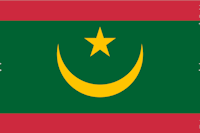Mauritania - Introduction
 Next to Mali on the west coast of the Sahara, Mauritania’s location and its majority Muslim population of three million make it a strategic player in a region that has been labeled an Al Qaeda hotbed. The West considers it a bulwark against rising extremism, though Mauritania’s recent history has been marked by instability. Mauritania, which has mostly known military rule since independence in 1960, is an arid, but potentially oil-rich country.
Next to Mali on the west coast of the Sahara, Mauritania’s location and its majority Muslim population of three million make it a strategic player in a region that has been labeled an Al Qaeda hotbed. The West considers it a bulwark against rising extremism, though Mauritania’s recent history has been marked by instability. Mauritania, which has mostly known military rule since independence in 1960, is an arid, but potentially oil-rich country.
The Islamic Republic of Mauritania (pictured) is on Africa's west coast, south of Morocco's Western Sahara province and north of Senegal. The country is three times the size of Germany in terms of land area, but has only 3.5 million people. It's mostly desert. Officially called the Islamic Republic of Mauritania, the country is one of the poorest in the world and has been criticized in the past for a series of social issues, including the force-feeding of women being groomed for marriage as well as an active slave trade.
Repeated abolition of slavery in Mauritania has had no real significance. During the French colonial period slavery was officially banned in 1901. Traditional slavery was formally abolished once again in 1980. As a result of centuries of this practice, Mauritanian society is characterized by former slave-owning groups of Arab-Berber origin, known as White Moors, and the Black Moor descendants of their liberated slaves who generally lived in the northern and eastern regions. Black African communities, also marked by slavery, traditionally resided in the southern part of the country near the Senegal River.
An estimated 10% to 20% of Mauritania’s 3.4 million people are enslaved — in “real slavery,” according to the United Nations’ special rapporteur on contemporary forms of slavery, Gulnara Shahinian. There are those who deny altogether that slavery exists and state that what remains are “vestiges of slavery”. Some deny it exists in their community, but point the finger at other ethnic groups; others claim it is limited to the Arab–Berber community; still others say it also exists in the other black African communities such as the Pular, Soninke and Wolof communities, but in the form of a caste–like system.
The constitutional reform of 2012 (loi constitutionelle No. 2012-015), which recognizes slavery as a crime against humanity, reflects the Government’s commitment and political will to eradicate slavery in the country. The new article 13 of the Act specifies that, no one may be held in slavery or any form of servitude or subjected to torture and other cruel, inhuman or degrading treatment.
The law addresses the individual criminal liability of slaveholders only; to be enforced, it relies entirely on the police and prosecution, which have shown a reluctance to follow up on allegations of slavery-like practices, with most cases being closed without any proper investigation. Moreover, no civil cause of action for victims of slavery, which would give victims of slavery or an independent mechanism acting on their behalf the right to appeal directly to the courts, has yet been introduced.
Public transportation is not safe in Mauritania, particularly in the interior. Taxis and public transportation are not considered to be secure forms of transportation for western visitors to Mauritania. Overland travel is difficult and roadside assistance is non-existent. The country’s size (larger than Texas and New Mexico combined) and harsh climate make road maintenance and repair especially problematic. Even small amounts of rain can make paved roads in Nouakchott impassable for cars without high clearance.
Foreign citizens traveling overland for long distances in Mauritania should travel in convoys, and be sure to have suitable four-wheel drive vehicles, a local guide, an adequate supply of water and food, and a second fuel reservoir. Multiple vehicles are recommended in case of breakdown. A Global Positioning System (GPS) receiver and satellite phone are essential when traveling in remote areas. Visitors are urged not to travel alone into the desert or after dark when outside of major urban areas.
The telecommunications infrastructure, including cellular telephone coverage, is limited. For those traveling outside the major urban areas, it is recommended to have a satellite telephone readily available.
Driving in Mauritania can be treacherous, and travelers should hire a trained local driver. Traffic patterns differ considerably from those in the United States and many Mauritanians drive without regard to traffic signs or rules. Roadway obstructions and hazards caused by drifting sand, animals, and poor roads often plague motorists. These hazards, when combined with the number of untrained drivers and poorly maintained vehicles, make heightened caution imperative at all times. Drivers should be extremely vigilant and all vehicle occupants should always wear their seat belts.
Driving outside of urban areas after dark is strongly discouraged. Landmines remain a danger along the border with the Western Sahara and travelers should cross only at designated border posts.
Medical and dental facilities in Mauritania are extremely limited and do not approach Western standards. Local pharmacies are to be used with caution. Many medicines are difficult to obtain or may be counterfeit. Travelers are advised to carry their own medical supplies, medications, and prescription eyewear. There are no Western mortuary services available in Mauritania.
|
NEWSLETTER
|
| Join the GlobalSecurity.org mailing list |
|
|
|

